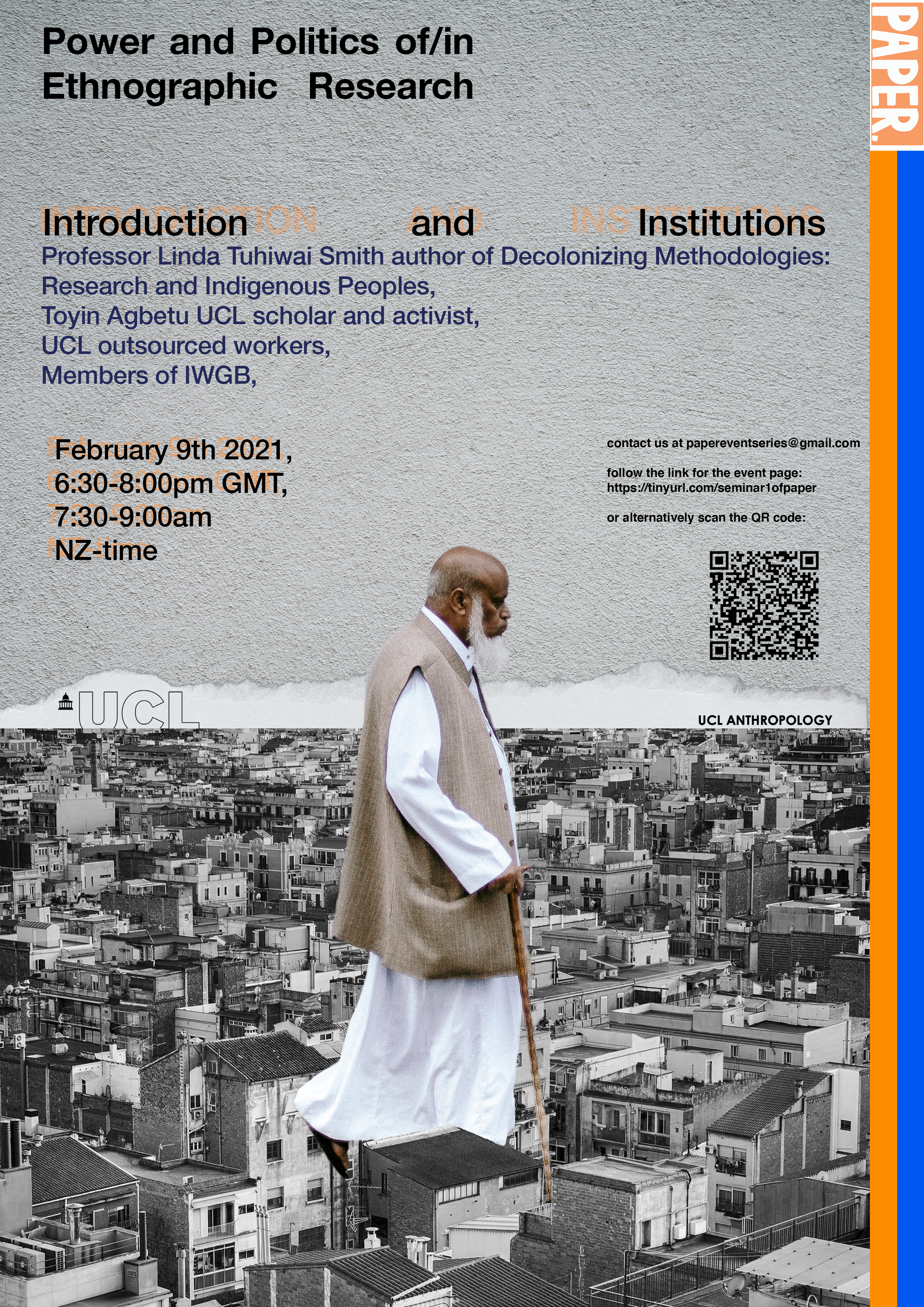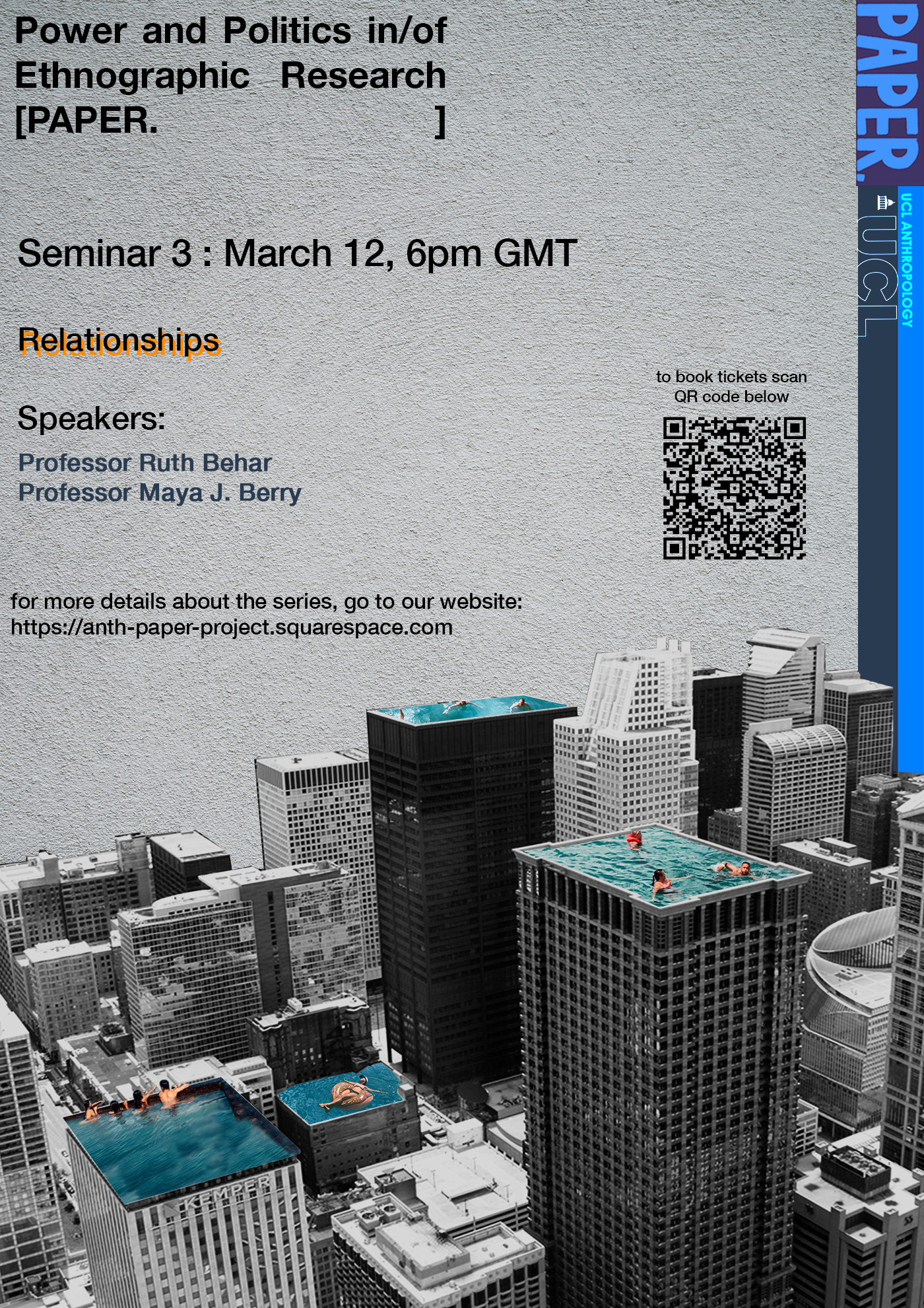Speakers

Seminar 1 - Introduction and Institutions
Our Introduction and Institutions event introduced the series, and focuses on the legacies of colonialism and exploitation in anthropology and how these persist today within academic institutions.Professor Linda Tuhiwai Smith
Author of Decolonizing Methodologies: Research and Indigenous PeoplesDanery Arias
‘Zero-hour’ contract UCL outsourced worker, member of IWGB.Toyin Agbetu
UCL scholar and activistToyin Agbetu is a scholar-activist and community-educator at Ligali, a Pan African, human-rights based organisation that challenges Afriphobia and the misrepresentation of African people, culture and history in the British media. He is an award winning, independent filmmaker who participates in numerous panel and broadcast discussions addressing Afriphobia, reparations, decolonisation and the repatriation of cultural artefacts from British museums. He acquired his master’s in social and cultural anthropology at University College London (UCL) for his research on Cultures of Protest and completed his undergraduate degree in Education and Community Development at the University of East London. Toyin is currently based at UCL’s anthropology department where he is completing his PhD on gentrification and institutional forms of activism in East London.
Dr Rafael Schacter (chair)
Dr Rafael Schacter is a Lecturer in Anthropology and Material Culture at University College London. Schacter works on public art and global art, curating and writing widely in both these areas. He has published three books, Street to Studio with Lund Humphries (2018), the award-winning World Atlas of Street Art and Graffiti with Yale University Press (2013), and Ornament and Order: Graffiti, Street Art and the Parergon with Routledge (2014). He most recently curated the exhibition Motions of this Kind at the Brunei Gallery (SOAS) in 2019, and has also curated at the Tate Modern (the Walking Tour for the Street Art exhibition in 2008), Somerset House (the exhibitions Futurismo Ancestral, Mapping the City, and Venturing Beyond in 2014, 2015, and 2016 respectively), amongst other national and international projects in Mexico, Madrid, Manila and beyond.

Seminar 2 - The ethics and politics of witnessing and participating
Our second seminar focused on the ethics and politics of witnessing and participating.Harshadha Balasubramanian
A PhD candidate in the Department of Anthropology, researching the role of creativity in social change. Her PhD project studies the experiences of practitioners adopting virtual reality (VR) in the creative industries, asking how they form and reform ideas about what and who VR is for. A defining feature of Harshadha's work so far has been exploring how non-normative epistemologies and practices may help to critically rethink anthropological fieldwork methods.Dr Laura Agustín
Laura Agustín is author of Sex at the Margins: Migration, Labour Markets and the Rescue Industry, as well as many media essays, academic articles, The Three-Headed Dog (a novel) and The Naked Anthropologist, her website. Find her on Twitter, Facebook and Youtube.Alice Riddell (chair)
Alice Riddell is a first year PhD candidate in Digital Anthropology at UCL. Alice’s research explores a live-streaming street crime app called Citizen, and its impact on neighbourhood relations in New York City. She is particularly interested in questions surrounding the impact of urban peer-to-peer surveillance, the complexities of citizen journalism and the emergence of the digital Panopticon.
In addition to conducting research, Alice produces teaching and homework resources for AnthroSchools, an initiative working towards decolonising the A-level curriculum, improving the accessibility of anthropology as a discipline, and introducing younger students to the social sciences through free and open-source materials.
Seminar 3 - Relationships
Our third seminar focused on relationships. We will be exploring the question of how our assumptions about research participants might guide our research design and lead to us asking questions that perpetuate essentialised images of certain groups of people, as well as what kind of relationships and solidarities we might form with research participants whilst in the field, and how these can further guide our work.Professor Ruth Behar
As a cultural anthropologist, poet and writer, teacher, and public speaker, Ruth Behar is acclaimed for the compassion she brings to her quest to understand the depth of the human experience. She was born in Havana and grew up in New York and has lived in Spain and Mexico. She returns often to Cuba to build bridges around culture, literature, art, and Jewish life.Her books about her travels, Translated Woman, The Vulnerable Observer, An Island Called Home, and Traveling Heavy, are acclaimed for their unique mix of personal and scholarly writing. She is the author of a bilingual book of poetry, Everything I Kept/Todo lo que guardé. Behar made her fiction debut with her autobiographic novel for young people, Lucky Broken Girl, which won the Pura Belpré Medal. Her new young adult novel, Letters from Cuba, a work of historical fiction, is based on her grandmother’s escape from Poland to start a new life in Cuba on the eve of the Holocaust. She was the first Latina to win a MacArthur “Genius” Grant. She has also received a Guggenheim Fellowship and was named a “Great Immigrant” by the Carnegie Corporation.
Behar is the Victor Haim Perera Collegiate Professor of Anthropology at the University of Michigan in Ann Arbor.
Prof Maya J. Berry
Maya J. Berry is Assistant Professor of African Diaspora Studies at University of North Carolina at Chapel Hill (UNC-CH). As a sociocultural anthropologist, Berry’s research employs a black feminist and performance-oriented lens to examine what existing movements toward black self-making in the contemporary “post-Fidel” era can teach us about the Cuban Revolution’s “updating” economic model and visions for its future, and the embodied articulation of black political imaginaries. An adjacent project critically interrogates the embodied aspects of conducting engaged research in post-colonial contexts, theorizing from the specificity of black women’s sexed and raced relationship to these sites of investigation. This work explores and advances a politically engaged anthropology rooted in black feminist praxis. Prior to UNC-CH she held a postdoctoral fellowship at the Institute of Sacred Music at Yale University. An artist-scholar of dance, race, politics, and performance, she was honored with the 2015 Zora Neale Hurston Award from the Association for Feminist Anthropology.Dr Ludovic Coupaye (chair)
Ludovic Coupaye is Associate Professor at the Department of Anthropology at UCL, where he’s been for the past ten years. From France, and half Malagasy, Ludovic was originally trained in archaeology, before he turned to anthropology, where his work brings together material and visual culture in Oceania; Art and Aesthetics among the Abelam; the Anthropology of Techniques, Skills and Materiality; and the Anthropology of Technology and Modernity. Ludovic is Departmental Tutor at UCL, a member of the departmental Anti-Racisms Committee, and is currently co-editing a Special Issue on Decolonising the Curriculum.

Seminar 4 - The ethics and politics of representation
Our fourth and final seminar focused on the ethics and politics of representation. We will be asking; what do we choose to include in our written work, and what do we exclude? What responsibilities do we have to our research participants while writing? Or when sharing our work outside of the academy (e.g. to policy-makers)? How can we remain accountable to our participants throughout the writing process? Where is it important to maintain secrecy; where might it do harm? How can we acknowledge our political positionality both during data collection and dissemination? And spaces of co-authorship.Dr Julia Sauma
Julia Sauma is a Brazilian-British and Deaf anthropologist whose research offers ethnographically rich and politically nuanced studies of collective life maintained within and against violent legal-political and relational structures. She has worked in metropolitan and frontier contexts in Brazil with street children and educators, and with Amazonian quilombolas (maroons) on race and ethnicity, political cosmology and ecology, myth and memory, kinship, gender and the body. Her monograph (in preparation) recounts quilombo families’ corporeal and conceptual efforts to maintain a vital collective life in the face of and against anti-Black ideologies and State-endorsed environmental destruction in the Brazilian Amazon. Julia’s work also reflects on personal experiences of racial, gender and disability discrimination, and the importance of miscommunication, in the making of anthropological knowledge.Professor Elena Fiddian-Qasmiyeh
Elena Fiddian-Qasmiyeh is Professor in Migration and Refugee Studies at the Geography Department at University College London (UCL) in the United Kingdom. She is the Co-Director of the UCL-Migration Research Unit and is the Founder and Director of the Institute of Advanced Studies ‘Refuge in a Moving World’ research network across UCL. She is currently leading a number of research projects, including ‘Local Community Experiences of and Responses to Displacement from Syria’, a.k.a. Refugee Hosts and ‘Southern-led Responses to Displacement from Syria’. With Yousif M. Qasmiyeh and the Baddawi Camp Cultural Club, Elena is also joint lead of the Baddawi Camp Lab as part of the AHRC Network+ programme, ‘Imagining Futures through [Un]Archived Pasts’. With a particular focus on the Middle East and North Africa, and drawing on a critical theoretical interdisciplinary perspective, Elena's work contributes to key debates surrounding refugee-led and Southern-led responses to forced migration, and to the politics of knowledge production vis-a-vis displacement.Dr Rik Adriaans (chair)
Rik Adriaans is a Lecturer (Teaching) in Digital Anthropology at UCL. He acquired his PhD from Central European University in 2018 with a doctoral thesis on transnational media and the politics of recognition in Armenia and the Armenian diaspora. His work on media, music, post-socialist transformation and diaspora has been published in journals such as Social Analysis, Identities, Nationalities Papers and Caucasus Survey. His current research explores the entanglements of digital youth culture, state propaganda and liberalism in Hungary.
